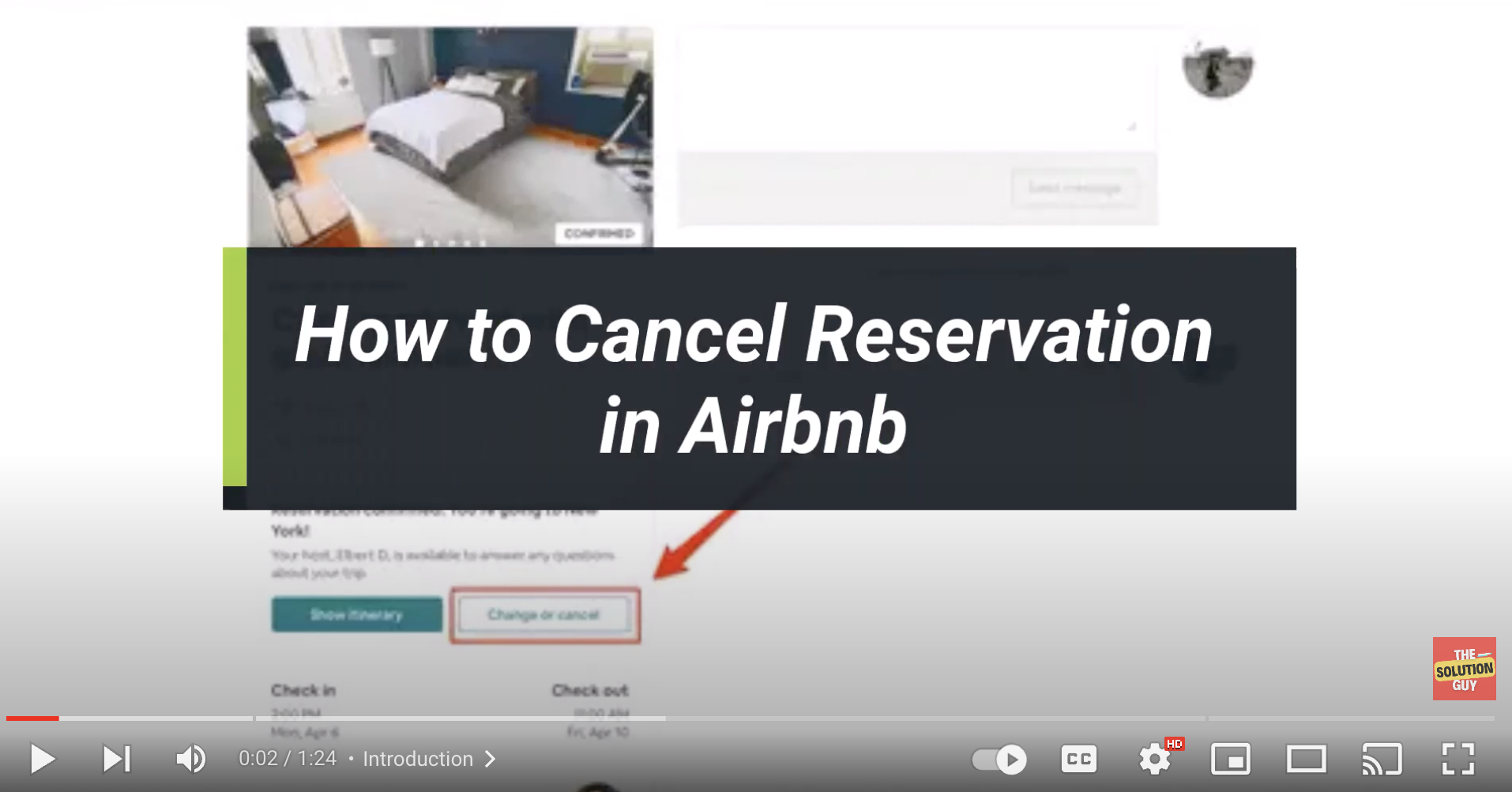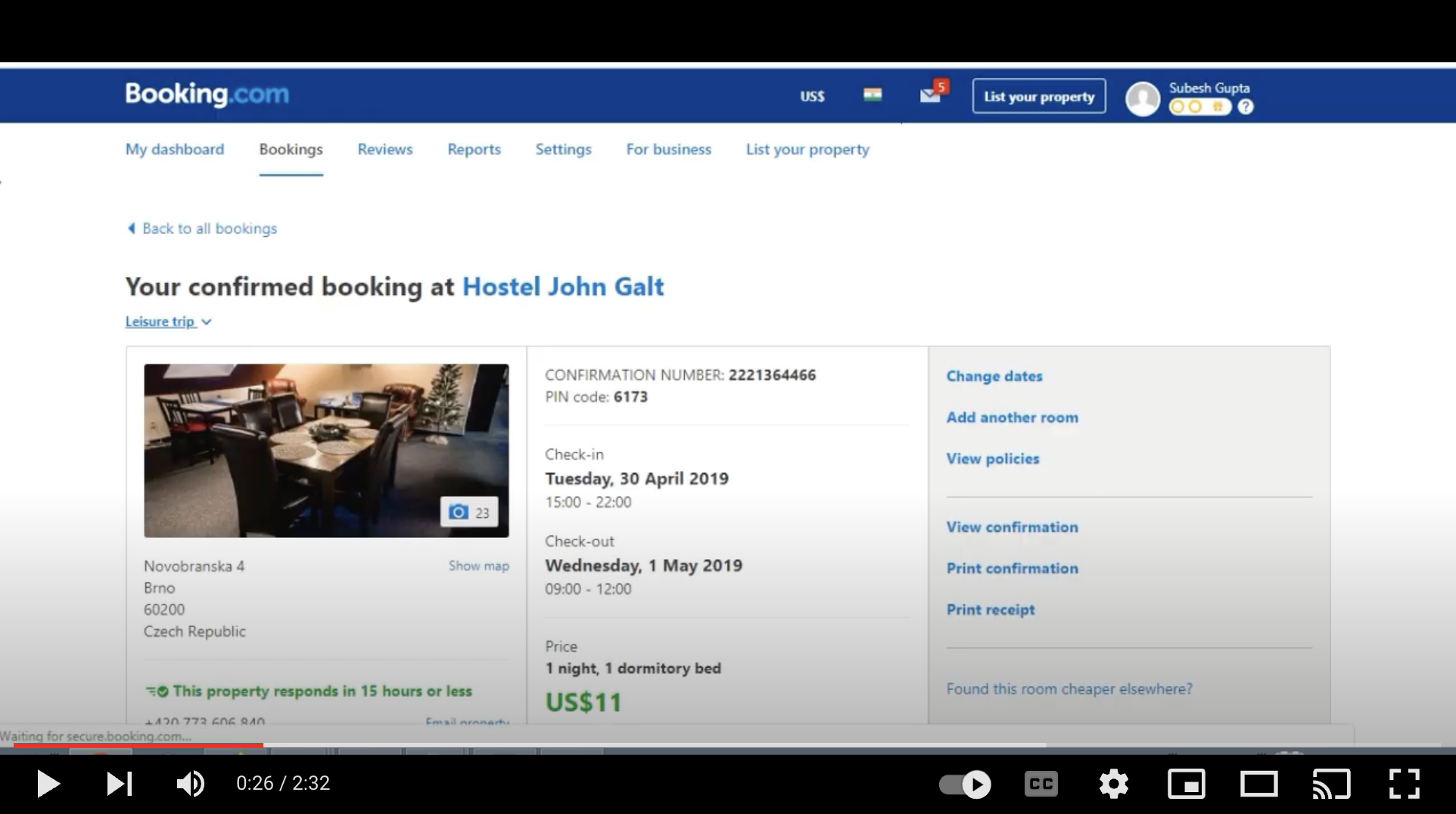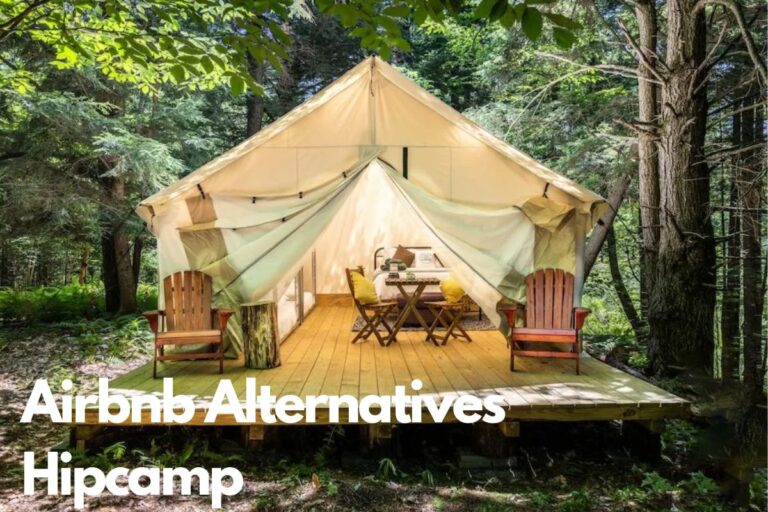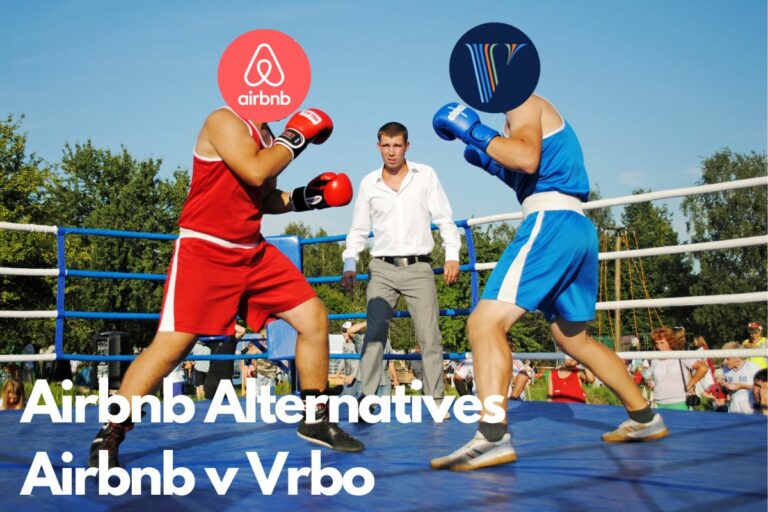Airbnb Alternatives – Airbnb v Booking.com – Decoding the Best Deals
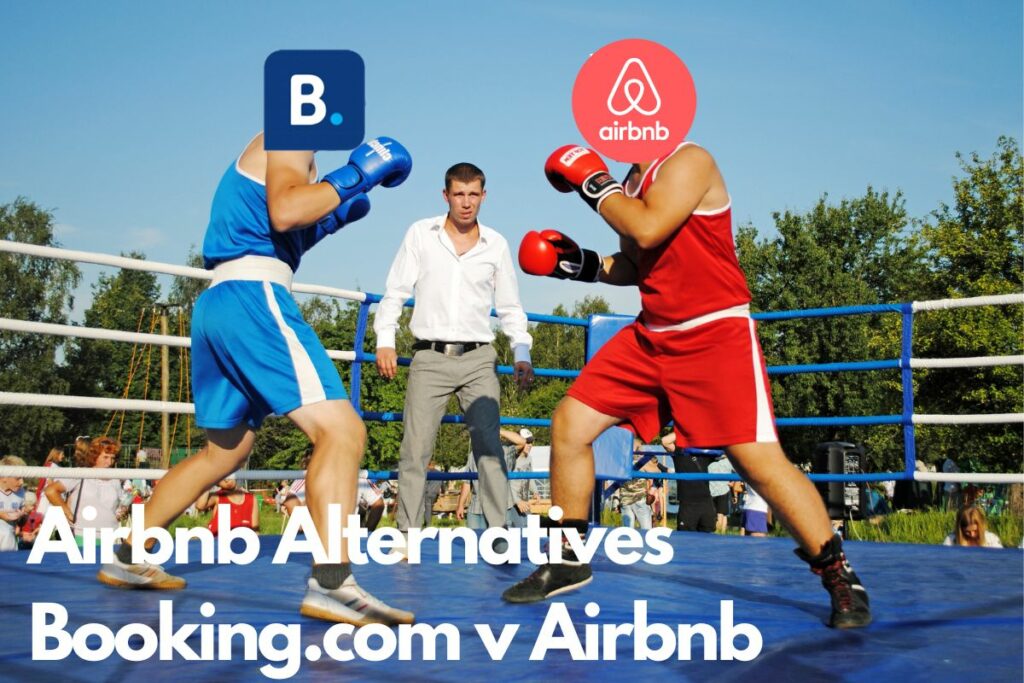
Airbnb Alternatives – Airbnb v Booking.com – so you just found a place on Airbnb and are about to book it. But there’s that little niggle that maybe you could get a better deal or cancellation policy elsewhere.
Well, read on because we’ve got your back.
Highlights
I looked at over 10,000 price comparisons between Airbnb and Booking.com. These were the same properties, same dates, and same number of guests, for 7 days or more.
Airbnb was, on average, 13% cheaper in 50% of cases, but Booking.com was also, on average, 13% cheaper in the other 50% of cases.
- Very rarely were the prices the same on both platforms
- There are no hard and fast rules regarding which platform is cheaper for any particular property.
- It very much pays to check pricing between platforms before you book.
- The average saving that I found was 13%
Note. The average booking spend is around $1,000 (4 nights at $250), so if a property is listed on both Airbnb and Booking.com, average savings are around $130 if you take the time to shop around.
Airbnb Alternatives – Airbnb v Booking.com
Introduction
The Rise of Online Accommodation Booking Platforms:
In my two decades in the Airbnb and vacation rental industry, I’ve witnessed a dynamic shift in how we approach travel and hospitality, largely shaped by pioneers like Airbnb and Booking.com. This digital revolution has effectively retired traditional brochure-based planning and reliance on travel agencies for bookings.
Now, in this digital-driven era, travelers enjoy unprecedented convenience, diversity, and autonomy in choosing accommodation. Airbnb and Booking.com stand as pivotal forces in this transformation. They’ve transformed our travel planning processes and broadened our accommodation expectations, offering unique and personalized experiences that were once hard to imagine.
Airbnb: A Synonym for Unique Stays

In this new world of travel, Airbnb stands out as a remarkable example of ingenuity and transformation. Originating from the modest concept of renting out air mattresses, it has evolved into a global powerhouse, redefining the hospitality industry. This platform seamlessly blends the ordinary with the extraordinary, catering to diverse preferences—from snug rooms in local apartments to opulent villas and whimsical treehouses.
At its core, Airbnb is more than just a service; it’s a community-centric ecosystem. It champions the idea of immersing oneself in local cultures, offering travelers a chance to experience destinations authentically, akin to living in a second home. This innovative approach has not only changed the way we travel but also how we connect with places and people worldwide.
Booking.com: The Epitome of Variety and Convenience

On the other side of the spectrum is Booking.com, a powerhouse in its own right, known for its vast array of options. From budget-friendly hostels to luxurious five-star hotels, Booking.com caters to every kind of traveler.
Its user-friendly interface, combined with an extensive global network, makes it a go-to for those seeking convenience and a wide selection at their fingertips.Both platforms have not only transformed the way we book our stays but also how we experience our destinations.
With user reviews, instant bookings, and a plethora of options, Airbnb and Booking.com stand as the vanguards of this digital revolution in travel, each offering unique propositions to the modern traveler.
As we delve deeper into the nuances of these platforms, it becomes clear that they are more than just booking sites; they are gateways to new experiences and undiscovered adventure
Company Backgrounds

Airbnb
During the last 15 years, I’ve witnessed the meteoric rise of Airbnb firsthand.
This innovative platform, conceived in 2008 by founders Brian Chesky, Joe Gebbia, and Nathan Blecharczyk, initially addressed San Francisco’s acute hotel room shortage during a major conference. Their ingenious solution? Turning their apartment into an “Air Bed and Breakfast” with air mattresses for guests.
What started as a makeshift lodging idea rapidly transformed into a global phenomenon. Airbnb has revolutionized the travel industry, evolving from a simple website to a sprawling online marketplace with an astonishing array of listings – from quaint apartments to grandiose castles.
Airbnb’s journey hasn’t just stopped at providing unique accommodations. It has continually evolved, introducing Airbnb Experiences, allowing locals to share unique tours and activities, and delving into high-end travel with Airbnb Luxe. This evolution is a testament to Airbnb’s adaptability and its unwavering commitment to enhancing travel experiences globally.
Airbnb’s business model
Airbnb’s business model operates on a platform-based approach, acting as an intermediary that connects hosts with guests. The company capitalizes on the sharing economy by allowing property owners to list their spaces – a room, an apartment, or a unique dwelling – for short-term rentals.
In turn, travelers seeking accommodations with a more personal touch can browse these listings.
Airbnb earns revenue by charging service fees to hosts and guests for each booking made through the platform. These fees generally range from 15% to 20%.
This model has enabled Airbnb to scale rapidly without the overheads associated with traditional hospitality businesses. As for its target market, Airbnb appeals to a broad spectrum of users, ranging from budget-conscious solo travelers to luxury-seeking vacationers.
The platform is particularly popular among millennials and younger travelers who value unique, local experiences over conventional hotel stays. However, its diverse range of accommodations also attracts families, business travelers, and adventure seekers, making it a versatile choice for various travel needs and preferences.

Booking.com
Booking.com’s journey, starting in 1996 in Amsterdam, is a remarkable tale of digital innovation and strategic growth. Geert-Jan Bruinsma founded it as a visionary Dutch startup, harnessing the internet’s potential to connect hotels with guests seamlessly.
Under the acquisition by Priceline Group (now Booking Holdings Inc.) in 2005, Booking.com leaped onto the international scene. It has since diversified its offerings well beyond hotel bookings, embracing a variety of accommodations, including apartments, vacation homes, and even unconventional options like treehouses and igloos.
Today, Booking.com is a colossal player in the travel marketplace, serving users in over 40 languages with a staggering 28 million listings.
This includes 6.2 million homes, apartments, and other unique properties. The platform has grown into an all-encompassing travel hub, providing accommodation reservations, car rentals, flight bookings, and airport taxi services. This evolution positions Booking.com as a comprehensive travel solution for millions globally, a testament to its enduring vision and adaptability in the ever-evolving travel industry.
Business model and primary audience.
Booking.com operates on a classic online travel agency (OTA) business model, primarily generating revenue through commissions.
When a customer books a hotel room or any other accommodation type through their platform, the property pays Booking.com a percentage-based commission on the booking value. This model has proven effective due to its vast inventory, which includes various accommodation types, from hotels and hostels to apartments and unique stays.
Booking.com appeals to both leisure and business travelers due to its extensive global reach and the variety of accommodations it offers. It caters to budget-conscious travelers looking for affordable options and luxury seekers searching for high-end accommodations.
The platform’s ability to provide additional travel services like car rentals and flight bookings further broadens its appeal, making it a one-stop shop for many travelers’ needs.
Types of Accommodation Offered
Airbnb
Airbnb offers various accommodation types to cater to various travelers’ needs and preferences. The platform’s listings include:
Private Rooms: Guests rent a room in a host’s home, providing a comfortable, home-like experience while often sharing spaces like the kitchen or living room with the host or other guests.
Entire Homes/Apartments: These listings offer the entire property to guests, ensuring privacy and full access to all amenities. They range from modest apartments to family-sized homes and are ideal for those seeking a home away from home.
Shared Rooms: In these arrangements, guests share a room or space with other guests or the host. This option is typically budget-friendly and popular among solo travelers and backpackers.
Unique Stays: Airbnb is known for its unique accommodations, which include treehouses, yurts, boats, and even castles. These listings offer one-of-a-kind experiences for guests looking for something beyond the ordinary.
Boutique Hotels and B&Bs: Many people don’t realize that Airbnb also lists boutique hotels and bed-and-breakfasts, catering to travelers who prefer the amenities and services of traditional hospitality with a more personalized touch.
Luxury Stays: Under the ‘Airbnb Luxe’ category, the platform offers high-end luxury properties with premium amenities, exceptional locations, and, often, additional services like a personal concierge.
Booking.com
Booking.com offers a wide and diverse range of accommodation types to cater to travelers’ varied preferences and needs worldwide. This extensive selection includes:
Hotels: From budget-friendly options to luxury hotels, catering to leisure and business travelers.
Apartments: Ideal for travelers seeking a home-like environment, offering more space and kitchen facilities.
Hostels: Targeted at budget-conscious travelers, particularly solo travelers and backpackers, offering dormitory-style rooms and communal facilities.
Vacation Homes are perfect for families or groups wanting more privacy and space. They are often located in popular holiday destinations.
B&Bs and Inns: Offering a more personal touch with breakfast included, these are often family-run and provide a cozy, homely atmosphere.
Guesthouses: Similar to B&Bs, guesthouses provide modest accommodation with a personal touch, often at affordable prices.
Unique Stays: This category includes more unconventional options like treehouses, igloos, boats, and yurts for travelers seeking a unique experience.
Resorts: Catering to travelers looking for all-inclusive options with recreational facilities like pools, spas, and activities.
Villas: Luxury accommodations ideal for high-end travelers seeking exclusivity and premium amenities.
Aparthotels: Combining apartment-style living with hotel-like services, suitable for short and extended stays.
As you can see from the above list, it’s no surprise that Booking.com boasts a massive 28 million listings. That’s pretty much 4 times as many listings as Airbnb.
Booking Process and User Experience
While sharing some similarities, the booking processes of Airbnb and Booking.com have distinct differences that cater to their respective platforms’ unique features and user experiences.
Airbnb’s Booking Process:
Search and Selection: Users start by entering their destination, dates, and number of guests. Airbnb then displays available listings, ranging from private rooms to entire homes and unique stays.
Detailed Listings: Each listing on Airbnb includes comprehensive details about the space, host rules, amenities, and reviews from past guests. Many listings also feature high-quality photos.
Communication with Hosts: Before booking, guests can contact hosts directly through Airbnb’s messaging system to ask questions or clarify details about the listing.
Booking Request: For many listings, guests submit a booking request, which the host must accept. Some listings offer “Instant Book,” allowing immediate confirmation without host approval.
Payment: Once a booking is confirmed, guests pay through Airbnb’s platform, which holds the payment until 24 hours after check-in before releasing it to the host.
Booking.com’s Booking Process:
Search and Selection: Like Airbnb, users input their travel details to search. Booking.com lists hotels and other traditional accommodations, including apartments, vacation homes, and unique stays.
Extensive Filters: Booking.com offers extensive filtering options to narrow down choices, including accommodation type, budget, review score, and specific amenities.
Hotel-Centric Information: Listings on Booking.com focus on room types, availability, pricing, hotel facilities, and policies. User reviews are also prominently displayed.
Instant Booking: Most accommodations on Booking.com offer instant booking, meaning users can confirm their reservation immediately without waiting for host approval.
Payment Options: Booking.com often provides various payment options, including paying online through the platform or making a direct payment at the property. The platform also frequently offers free cancellation policies.
Key Differences:
Host-Guest Dynamics: Airbnb champions a model that fosters meaningful interactions between hosts and guests, a contrast to the more hotel-centric approach of Booking.com, where such personal exchanges are less common.
Diversity of Listings: Airbnb stands out for its eclectic and personal accommodations, offering unique experiences. In contrast, Booking.com caters to a wider spectrum, embracing everything from traditional hotels to other lodging types.
Booking Approaches: Airbnb provides flexibility, offering instant bookings alongside request-to-book options. Booking.com, however, predominantly streamlines the process with its instant booking feature.
Cancellation Flexibility: Airbnb allows hosts to define their own cancellation policies, leading to significant variability. Booking.com, on the other hand, often implements standardized, property-specific policies, generally offering greater flexibility.
Airbnb is synonymous with personalization, spotlighting host-guest interactions and distinctive stays. Booking.com, alternatively, aligns more with traditional lodging preferences, offering immediacy and flexibility in bookings across a broader range of accommodation types.
Airbnb Alternatives – Airbnb v Booking.com
Listing Numbers – Airbnb v Booking.com (BDC)
When writing (Jan 2024), HiChee shows 7,333,116 Airbnb listings and 5,132,468 Booking.com listings. The BDC number equates to Airbnb-type listings; they also offer millions of hotel options.
Interestingly enough, 418,713 of those listings appear on both Airbnb and Booking.com, so it always pays to check booking options on HiChee’s individual price comparison reports, as they are rarely listed at the same price on both websites.
The price difference between platforms can be huge.
How To Price Check On HiChee
Airbnb Alternatives – Airbnb v Booking.com
User Experience
Both platforms have fantastic mobile apps and desktop websites.
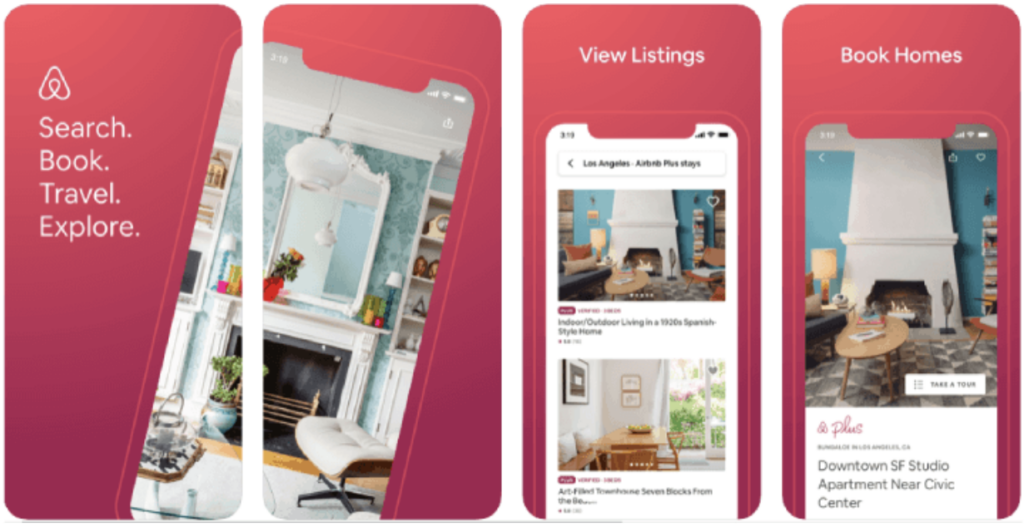
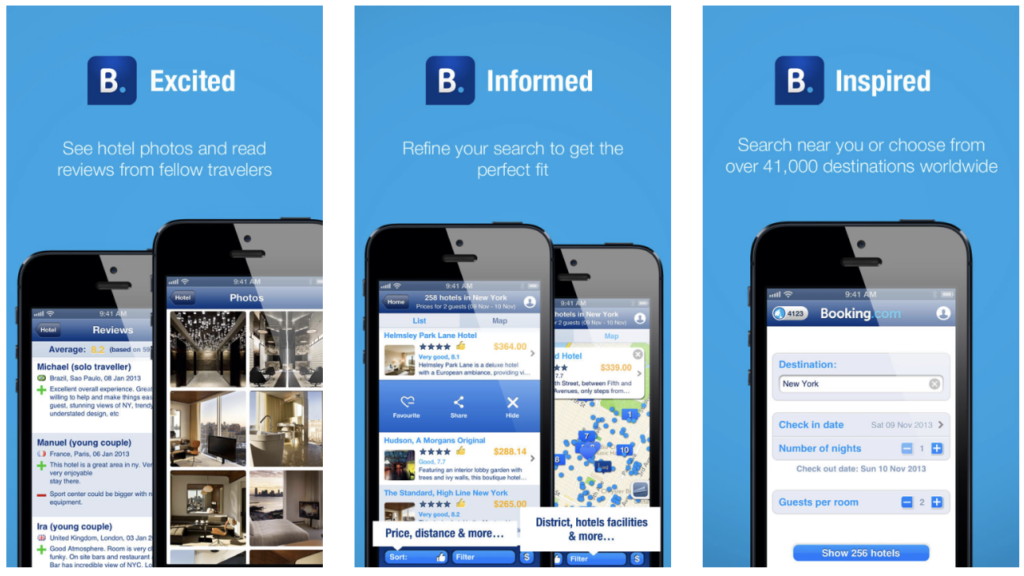
Get Booking’s mobile app by scanning the QR code below

Pricing structures
Airbnb
Airbnb’s pricing structure can be divided into several components:
- Base Price: This is the amount the host sets for staying at their property. It can vary depending on the time of the year, day of the week, and length of stay.
- Cleaning Fee: This is an additional fee charged by the host to cover the cost of cleaning their space after a guest’s stay. It’s a one-time fee per booking and not per night. The host sets this fee and can vary greatly depending on the property and the host’s preferences.
- Service Fee: Airbnb charges a service fee to both guests and hosts. For guests, this fee is a percentage of the total booking cost (including the base price and cleaning fee, but excluding Airbnb fees and taxes) and is typically under 14.2%. This fee helps Airbnb run its platform and offer services like 24/7 customer support.
- Note that Airbnb’s service fee fo Airbnb Luxe properties is 20%
- Extra Guest Fees: Some hosts charge additional fees for extra guests beyond a certain number. This accommodates additional costs associated with more people staying, like extra bedding, wear and tear, and utilities.
- Security Deposit: Some listings require a security deposit set by the host. This is not charged upfront but is a hold or authorization on the guest’s payment method to cover potential damage to the property.
- Local Taxes: Depending on the property’s location, additional local taxes may apply. Airbnb collects and remits these taxes in many jurisdictions.
- Other Fees: Occasionally, there may be other fees, such as pet fees or using certain amenities.
It’s important to note that Airbnb’s pricing and fee structures are subject to change and can vary by location and specific booking details. Guests are advised to review the total cost breakdown provided by Airbnb before confirming a booking to understand all applicable fees.
Booking.com
Booking.com’s pricing structure includes commission rates, cleaning fees, and payment methods.
- Commission Rates: Booking.com charges a commission rate to hosts for each booking made through their platform. This rate varies based on location, property type, and cancellation policy. The average commission rate is around 15% but ranges from 10% to 25%. These commissions are passed on to travelers as hosts increase their base rates when adding their listings to BDC.
- Cleaning Fees and Security Deposit: Hosts on Booking.com can add cleaning fees and security deposits to their listings. .
- Payment Methods: Booking.com offers various payment methods for hosts to receive guest payments. These include online methods like credit/debit cards (Visa, Mastercard, American Express, etc.), PayPal, AliPay, and offline methods like bank transfers and cash payments.
- No Hidden Fees: It’s important to note that Booking.com does not have hidden costs. The platform is transparent about the fees charged, including the commission rate.
Airbnb Alternatives – Airbnb v Booking.com
Cancellation Policies and Flexibility
What happens if I cancel an Airbnb booking?

Believe it or not, Airbnb has 9 different types of cancellation policies, and if that isn’t confusing enough, they also have special case policies for certain countries.
Hosts generally choose which policy they wish to apply to each listing. These range from flexible to strict.
Don’t worry too much, as the cancellation details are clearly shown in the ‘Things to know’ section of each listing.

Just add your dates, and you will see the cancellation policy details for your proposed booking.

Click on the ‘Show more’ link, and you will see the full details regarding the dates applicable to canceling and the percentage of refund that you will receive.
The policy shown below is just an example, and as I say, hosts can choose from over 9 different policies, so pay attention here.
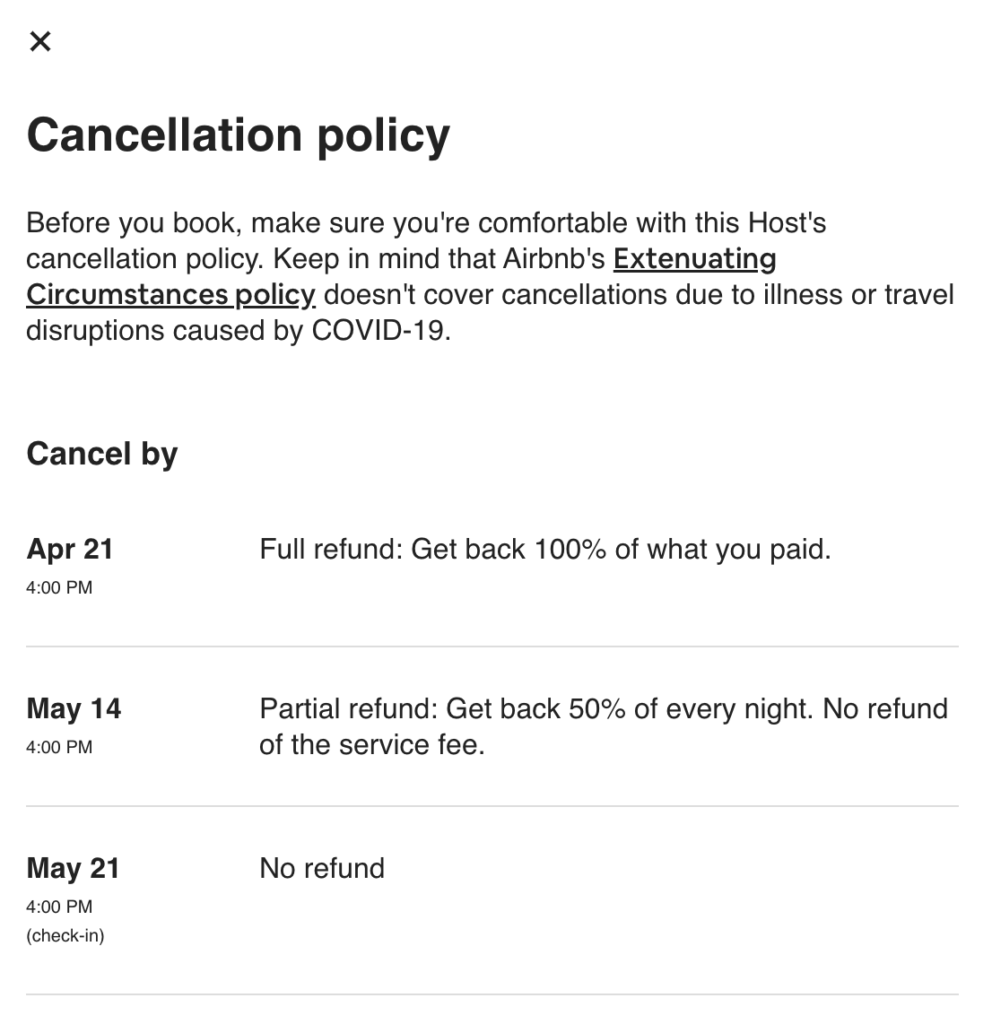
Make sure you check specific details before booking any Airbnb property to avoid any upset should you cancel for any reason.
What happens if the host cancels an Airbnb booking?
There may be occasions when a host has to cancel your booking. These could include things like double bookings, the property has been damaged, earthquakes, hurricanes, a pandemic, etc.
Here’s what Airbnb will do if a host cancels a booking…
While it’s rare, sometimes a Host may need to cancel a reservation. We understand this can impact your plans in a big way. Rest assured that every booking made on Airbnb comes with AirCover, protection for guests against significant issues, including Host cancellations within 30 days of check-in.
In the unlikely event a Host needs to cancel your booking within 30 days of check-in, you’ll automatically get a refund and we can help you find a similar or better home to rebook.
Bear in mind that although Airbnb states that they will help you find a similar or better home to rebook, this may not be possible in high season or in rural areas.
How do I cancel an Airbnb booking?
Just follow this short video to cancel an Airbnb reservation.
What happens if I cancel a Booking.com booking?

Similar to Airbnb, BookingCom has various cancellation policies that differ from listing to listing depending on individual host preferences. These can vary from room to room, season to season, etc.
Before booking, check the ‘Book this holiday home’ section. In the example below, you can see that this booking is non-refundable.
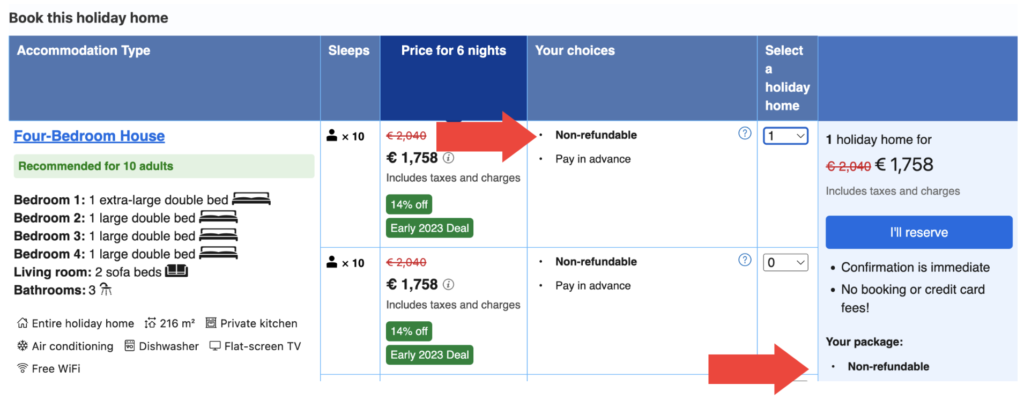
Whereas, in the example below, this listing offers free cancellation up to 30 days prior to arrival.
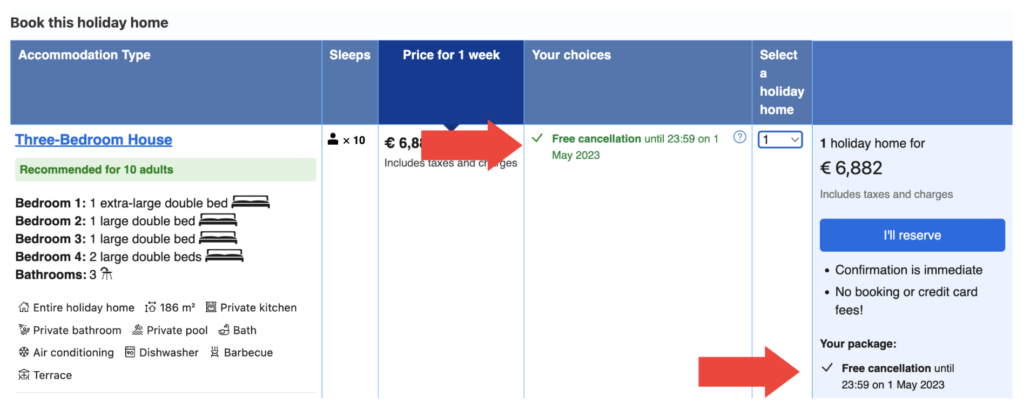
As I said before, cancellation policies vary from listing to listing, room by room, and seasonally, so always check it before you book it,
What happens if the host cancels an BDC booking?
If the host cancels the reservation, Booking.com refunds you immediately; however, the processing time may take 7 to 10 days, depending on the bank.
How do I cancel a Booking.com booking?
Just follow this short video to cancel a Booking.com reservation.
Airbnb Alternatives – Airbnb v Booking.com
Customer Support and Safety
Airbnb
Airbnb offers various methods for hosts and guests to contact customer support. The primary way is through their website, specifically the Help Center, where users can describe their issue to be directed to the appropriate department. They also offer live chat for real-time assistance. For more direct communication, Airbnb provides various phone numbers for different regions, allowing for quicker resolution of issues.
Email is another option for those who prefer written communication without service fees, although it might take longer to receive a response. Social media channels like Twitter, Instagram, and Facebook are also actively used by Airbnb for customer interactions.
Booking.com
Booking.com offers customer service support 24/7 through various channels. Customers can contact agents via message or phone for any urgent matters. The platform also encourages direct communication with each property for details about stays.
Additionally, Booking.com provides a Help Center where users can find answers to common questions, such as cancellation policies, payment procedures, and making changes to bookings. This comprehensive support system ensures that you can get assistance with your bookings and other queries at any time.
Conclusion
In conclusion, when comparing Airbnb and Booking.com for travelers seeking the best accommodation options, it’s clear that both platforms have their unique strengths.
My analysis of over 10,000 price comparisons (where properties are on both platforms) revealed that substantial savings can be made in most cases, with an average saving of 13%.
This indicates there’s no definitive cheaper option between the two; it largely depends on the specific property and dates.
The key takeaway for travelers is the importance of comparing prices on both platforms to potentially save an average of $130 on a typical booking of around $1,000.
Both Airbnb and Booking.com offer diverse accommodation options and user-friendly experiences, but their pricing can vary significantly, underscoring the value of shopping around.
See More Airbnb Alternatives


Alan has been working in the vacation rental sector since 2004, when he first created a listing site for his property management company. He has been helping short-term rental owners and managers to stand out in an over-saturated marketplace for over 12 years and has written thousands of articles in that time.
He has written books on vacation rental photography and was the first in the industry to create online marketing courses for hosts.
He has given keynote presentations across various subjects at The Vacation Rental World Summit, VRMA, VRMintel, Host, and The Book Direct Summit.


